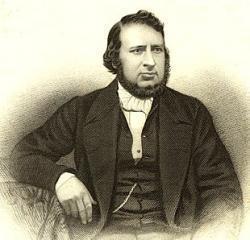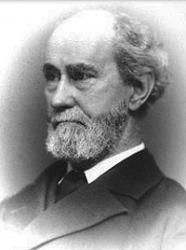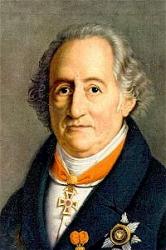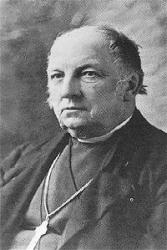Planning worship?
Check out our sister site, ZeteoSearch.org,
for 20+ additional resources related to your search.
- |
User Links
Person Results
‹ Return to hymnal






Export as CSV
J. G. Dailey
1854 - 1927 Hymnal Number: d498 Author of "He loved, he loved me so" in The New Alphabetical Hymnal Born: Circa March 1854, Delaware (was living in New Castle County in 1860).
Dailey moved to Brockwayville, Pennsylvania, with his mother in 1872, and was still there as of 1892. In 1900 he was in Fredonia Village, New York, and in Philadelphia, Pennsylvania, in 1910 & 1920. His works include:
A Collection of Gospel, Temperance, and Prohibition Songs, What’s the News (Brockwayville, Pennsylvania: 1888)
Love (Brockwayville, Pennsylvania: 1892)
Prohibition Chimes for Temperance, Prohibition and All Reform Meetings (New York: Dailey & Mead, 1900)
--www.hymntime.com/tch/
Additional information and photos can be found here:
James Gerald Dailey II (1854-1927) and Fear Not, Little Flock.
J. G. Dailey
James Oren Thompson
1834 - 1917 Person Name: J. O. Thompson Hymnal Number: d77 Author of "Lord of harvest, send forth reapers" in The New Alphabetical Hymnal Born June 9, 1834 in Waldo, ME. He was a minister before joining the army and fighting in the Civil War. After the war he joined the Methodist Episcopal Maine Conference in 1866. He transferred to the Providence, RI conference and retired in 1886. He moved to Keyser, WV and edited The Mountain Echo. He then moved to Charleston, WV and served as secretary of the Agriculture. In 1905 he moved to St. Petersburg, FL where he was the minister at the First Ave. Methodist Church. He died Sept. 28, 1917.
From Hymn Studies http://homeschoolblogger.com/hymnstudies/
James Oren Thompson
David Nelson

1793 - 1844 Hymnal Number: d249 Author of "For O, we stand on Jordan's strand" in The New Alphabetical Hymnal Nelson, David, M.D., son of Henry Nelson, was born near Jonesborough, East Tennessee, Sept. 24, 1793. He graduated at Washington College, Virginia, in 1810, and took his M.D. degree at Philadelphia in 1812. He acted for some time as a surgeon in the war against Great Britain. During that time he became an infidel, but returning to the faith, he, in 1823, resigned medicine and took up theology, and subsequently became a Presbyterian Minister. He held several appointments, and founded two manual-labour colleges, one at Greenfields, and the second near Quincy, Illinois. He died Oct. 17, 1844. His hymn, "My days are gliding swiftly by" (Death Anticipated), was written in 1835, to be sung to the tune of "Lord Ullin's Daughter." It is exceedingly popular. [Rev. F. M. Bird, M.A.]
--John Julian, Dictionary of Hymnology (1907)
David Nelson
W. E. Penn
1832 - 1895 Hymnal Number: d415 Author of "Then why will ye die" in The New Alphabetical Hymnal Penn, William Evander. (Near village of Old Jefferson, Rutherford County, Tennessee, August 11, 1832--April 29, 1895, Eureka Springs, Arkansas). Southern Baptist. Evangelist in Texas and other states, 1875-1895. Compiled three hymnals titled Harvest Bells (1881, 1884, 1887) for use in his meetings. His hymns were primarily revivalistic in emphasis. His finest hymn, "There is a rock in a weary land, Its shadow falls on the burning sand" was paid the compliment of being reworked and issued under the name of Edward Husband in D.B. Towner's Revival Hymns (Chicago, 1905).
He and his wife Corilla Frances Sayle adopted three children. Ordained December 4, 1880.
--David W. Music, and additional information from the DNAH Archives
See:
Linder, Michael. (1985). William Evander Penn : his contribution to church music (Unpublished doctoral dissertation). Southwestern Baptist Theological Seminary, Fort Worth, Texas.
The Life and Labors of Major W. E. Penn. (1896). St. Louis: C. B. Woodward Printing).
W. E. Penn
George William Conder

1821 - 1874 Person Name: G. W. Conder Hymnal Number: d15 Author of "All things praise thee, Lord most high" in The New Alphabetical Hymnal Conder, George William, only son of George Conder, was born at Hitchin, Herts, Nov. 30,1821. After studying at Highbury College, London, he became, in 1845, co-pastor, with Mr. Judson, of High Wycombe Congregational Church. In 1849 he succeeded the late Dr. Winter Hamilton as minister of Belgrave Chapel, Leeds, passing thence to Cheethum Hill, Manchester, in 1864, and Queen's Road, Forest Hill, London, 1870. He died at Forest Hill, Nov. 8, 1874. Whilst at Leeds he assisted in compiling the Leeds Hymn Book 1853. He also published in 1874 an Appendix to that selection to which he contribute "All things praise Thee, Lord most high," and " Lord Jesus, Shepherd of mankind." [Rev. James Mearns, M.A.]
--John Julian, Dictionary of Hymnology (1907)
================
Conder, G. W. , p. 255, ii. Other hymns by him in his Appendix, 1874, are, "Now to the glorious Trinity" (Laying a Foundation Stone), and "Lord, may a sinful little child?" (A Child's Prayer).
--John Julian, Dictionary of Hymnology, Appendix, Part II (1907)
George William Conder
Robert Morris

1818 - 1888 Hymnal Number: d68 Author of "Memories of Galilee" in The New Alphabetical Hymnal Morris, Robert, LL.D., born Aug. 31, 1818, is a member of the Presbyterian Church, and an extensive writer on Freemasonry. In 1868 he visited the Holy Land on behalf of the Freemasons of America, the outcome of which was his work, Freemasonry in the Holy Land. He is the author of some 300 poetical pieces. One of these, "Each gentle dove and sighing bough" (Evening), is in H. R. Palmer's Songs of Love for the Bible School, 1874, Sankey's Sacred Songs and Solos, 1881, &c..
--John Julian, Dictionary of Hymnology, Appendix, Part II (1907)
Robert Morris
J. W. von Goethe

1749 - 1832 Hymnal Number: d322 Author of "Purer yet and purer I would be in mind" in The New Alphabetical Hymnal Goethe, Johann Wolfgang von, son of Johann Caspar Goethe, a lawyer at Frankfurt-am-Main; was born at Frankfurt Aug. 28,1749, and died at Weimar, March 22, 1832. The greatest German poet of his day, and one of the most famous literary men of his own or any age, his sympathies were Classical rather than distinctively Christian; and as he himself said (Conversations with Eckerman, January 4, 1827), he wrote no poems suited for use in public worship.
A few pieces, principally from his well-known dramatic poem of Faust (pt. i. 1808; pt. ii. pub. posthumously, 1832), are found under his name in one or two Unitarian hymn-books. Good translations of both parts of Faust have been published by Dr. John Anster, Bayard Taylor, Sir Theodore Martin, and others; while a very large number of other persons have published translations of the first part. No attempt has accordingly been made to notice any translations except those in the hymn-books.
i. From Faust, pt. i., 1808.
i. Christ ist erttanden! Freude dem Sterbliche. Easter. The chorus of angels on Easter Day. Translated as “Christ has arisen! Joy to our buried Head," by Dr. F. H. Hedge, in his Supplement to Hymns for the Church of Christ, Boston, U.S., 1853, No. 836. A free version is also noted under A. C. Cox, No. 4.
ii. Die Sonne tönt nach alter Weise. Praise. The Song of the three Archangels in the Prologue in Heaven. Translated as "The sun is still for ever sounding," by Dr. F. H. Hedge, as above, 1853, No. 190.
iii. Verlassen nab ich Feld und Auen. [Evening]. Faust's Soliloquy on entering his study with the dog, Translated as "O'er silent field and lonely lawn," as No. 21 in W. J. Fox's Hymns & Anthems, 1841, repeated in English and American Unitarian collections.
ii. Miscellaneous.
iv. Des Maurers Wandeln. Written for the Freemasons' Lodge at Weimar, of which he became a member in 1780, and included in his Werke, 1828, vol. iii. p. 61, entitled "Symbolum." Translated as "The Mason’s ways are A type of Existence," by T. Carlyle, in his Past and Present, 1843, p. 318. Included,beginning "The future hides in it" (st. ii.), as No. 854 in Dr. Hedge's Collection, 1853, as above.
Two pieces are also found in collections under his name, viz.:—
1. Without haste! without rest, in Hymns of the Ages, Boston, U.S., 3rd Ser., 1865, p. 76, and repeated as "Without haste and without rest," in Stopford Brooke's Christian Hymns, 1881, &c. It is suggested by " Wie das Gestern Ohne Hast, Aber Ohne Hast, Drehe sich jeder, Urn die eigne Last," in Goethe's Zahme Xenien, 2nd Ser., 1823 (Werke, 1828, iii. p. 245).
2. Rest is not quitting The busy career. [Rest]| This is part of a piece beginning "Sweet is the pleasure Itself cannot spoil." No. 853 in Dr. Hedge's Collection, 1853, as above, marked as by " J. S. Dwight." There does not appear to be any equivalent poem in Goethe's Werke. [Rev. James Mearns, M.A.]
--John Julian, Dictionary of Hymnology, (1907)
===========================
Goethe, J. W. von, p. 441, i. The Exeter Unitarian Hymns, Psalms and Anthems, of 1863 and 1884, contains the several additional hymns from Goethe, the translations in each case being by the Rev. T. W. Chignell. Some of the versions are very free, and the distinctively Christian character of the translations is only very faintly present in the originals. [Rev. James Mearns, M.A.]
--John Julian, Dictionary of Hymnology, Appendix, Part II (1907)
J. W. von Goethe
Ralph Wardlaw

1779 - 1853 Hymnal Number: d105 Author of "Hail, morning known among the blest" in The New Alphabetical Hymnal Wardlaw, Ralph, D.D. This venerable and (in his generation) influential Scottish divine contributed twelve hymns to the praise of the Church Universal that are likely to live in a humble and useful way. As having so done, and besides edited several collections of hymns, he claims a place of honour in this work. Critically, and regarded as literature, his hymns have little of poetry in them; no "winged words" to lift the soul heavenward. They reflect simply and plainly the lights and shadows of everyday experiences of the spiritual life, rather than its etherialities and subtleties. His "Lift up to God the voice of praise " is the most widely known; and there is a certain inspiriting clangour about it when well sung; yet it is commonplace. His "Hail morning, known among the blest," is narrative and prosaic, though it filled a gap at the time in Sabbath morning worship. “At the time by God appointed," "Remember Thee! remember Christ!" and "Contemplate, saints, the source divine," have vanishing gleams of imaginative light and fine and tender emotion. "O how good the hallowed union," "Where the sounds of plaintive wailing," and "See the Sun of truth arise," are melodious and singable, and pleasant but shallow. “Christ of all my hopes the ground," (Pt. ii.) "When with wasting sickness worn," is much too long, but is a fairly good song of Zion. Wardlaw published in 1803 a Selection of Hymns, to displace what was called The Tabernacle Collection, 1800, that had been used by the Congregationalists of Scotland, and to which he contributed a few hymns. He was assisted in the preparation of this compilation by Dr. Charles Stuart, of Dunearn. The first edition contained 322 hymns. In 1817 a Supplement was added of 171, bringing up the number to 493. Of these eleven (or twelve strictly) were by Wardlaw. Two of these had previously appeared in the Scottish Missionary Magazine (vol. viii. 48). His hymns bear so very slight a proportion to Dr. Wardlaw's writings as a profound theologian and expositor and thoroughly-equipped controversialist on the chief problems of the period, as to make it necessary to refer the reader to his remarkable Life, by the Rev. Dr. W. L. Alexander, entitled, Memoirs of the Life and Writings of Ralph Wardlaw, D.D. (2nd ed., 1856).
Wardlaw was born at Dalkeith on December 22, 1779, where he received his early education, later attending Glasgow University. His only church was in Glasgow. He died at Easterhouse near Glasgow on Dec. 17, 1853, and his public funeral is still remembered for the representative character of the vast multitude who attended it. [Rev. A. B. Grosart, D.D., LL.D.]
Of Dr. Wardlaw's hymns the following are still in common use:—
1. Glad when they saw the Lord. Easter.
2. Hail, morning known amongst the blest [saints]. Sunday Morning.
3. Lift up to God the voice of praise. Praise to the Father.
4. 0 Lord our God, arise. Missions.
5. Remember Thee, remember Christ. Holy Communion.
6. See the Sun of Truth arise. Christ the Light.
Of these Nos. 3-5 appeared in the Tabernacle Collection, 1800.
-- John Julian, Dictionary of Hymnology (1907)
=============
Wardlaw, R., p. 1232, ii. Of his hymns, Nos. 1, 2 are in his Selection, 1803, and No. 6 was added in the Supplement of 1817. This Supplement also contains "O how good the hallowed union," and "Whence the sounds of plaintive wailing," p. 1232, ii.
--John Julian, Dictionary of Hymnology, New Supplement (1907)
Ralph Wardlaw
William Croswell Doane

1832 - 1913 Person Name: William C. Doane Hymnal Number: d20 Author of "Ancient of days, who [that] sittest enthroned [throned] in glory" in The New Alphabetical Hymnal Doane, William Croswell, D.D., son of Bp. G. W. Doane (p. 303, ii.), was born at Boston, Mass., March 2, 1832, and ordained D. 1853, and P. 1856, in the Prot. Episcopal Church of America. He was Rector of Burlington, N.J., Hartford, Conn, and Albany; and since 1869 Prot. Episco. Bishop of Albany. He is the author of a Biography of his father, and other works. His fugitive verse was collected and published [in 1902], as Rhymes from Time to Time. His hymn, "Ancient of Days, Who [that] sittest throned in glory" (Holy Trinity), was written for the Bicentenary of the City of Albany, 1886. In some collections it begins with stanza ii., "O Holy Father, Who hast led Thy children." For full text see The Hymnal, edition 1892, of the Prot. Episco. Church of America, No. 311. Bp. Doane is D.D. of Oxford, and LL.D. of Cambridge. [Rev. L. F. Benson, D.D.]
--John Julian, Dictionary of Hymnology, New Supplement (1907)
William Croswell Doane
Henry Stevenson Washburn
1813 - 1903 Person Name: Henry S. Washburn Hymnal Number: d223 Author of "For he is good, the Lord is good" in The New Alphabetical Hymnal Washburn, Henry S., was born at Providence, Rhode Island, June 10, 1813; spent his boyhood at Kingston, Massachusetts, and was educated at Worcester and Brown University. Subsequently he was a manufacturer at Worcester and Boston. Since 1875 he has been the President of the Union Mutual Life Insurance Co. Mr. Washburn has held some prominent posts, and has been active in public matters. He has written various hymns and songs, the best known of which is:—
Let every heart rejoice and sing . National Hymn. This "was written for a celebration in Faneuil Hall, Boston, July 4, 1842, and sung by the Sunday School Children of the city." It was set to music by Garcia, and often subsequently used at home and abroad. The author altered it for The Psalmist, 1843, No. 1005; and in that form it has been generally known. [Rev. F. M. Bird, M.A.]
-- John Julian, Dictionary of Hymnology (1907)
Henry Stevenson Washburn


 My Starred Hymns
My Starred Hymns


